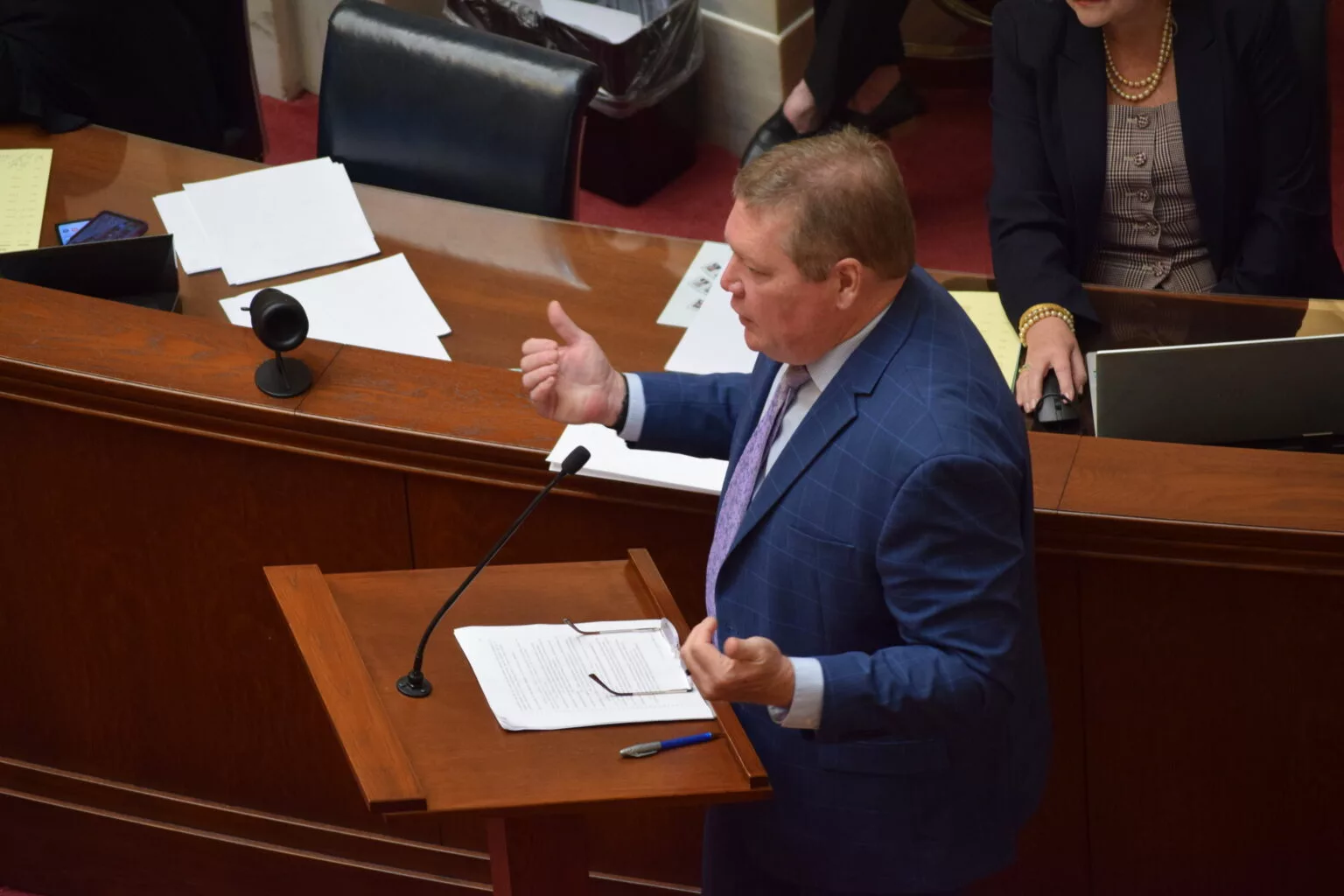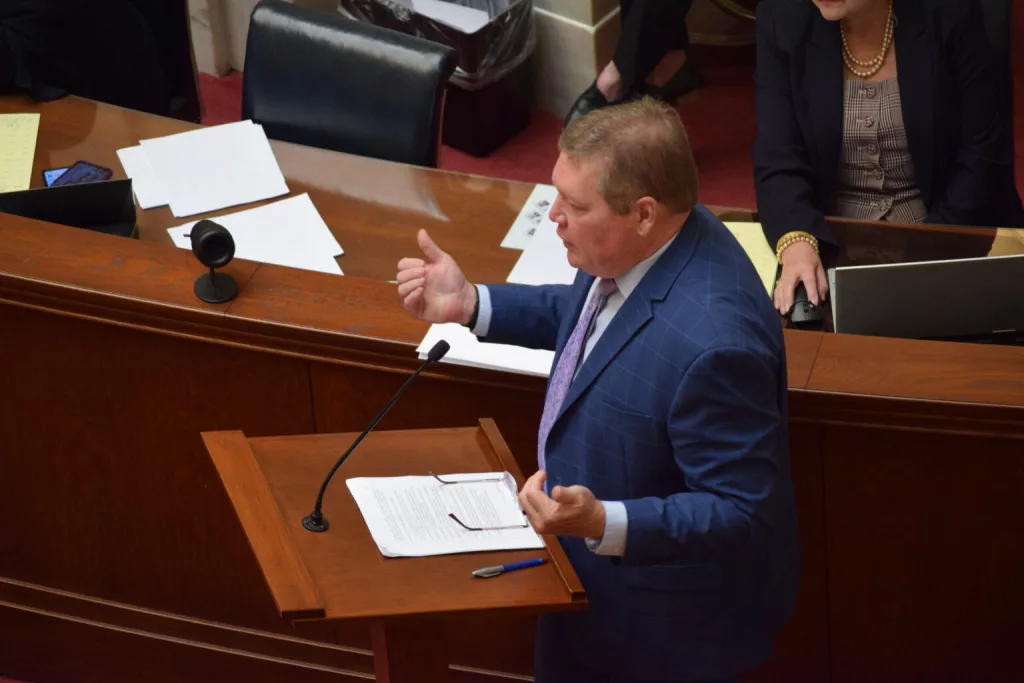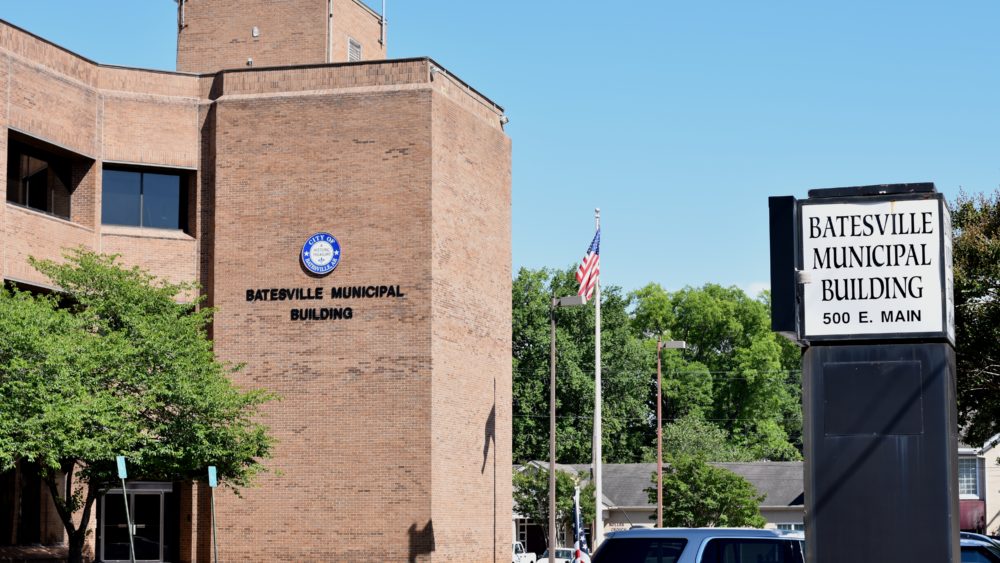
Featured image: Sen. Bryan King, R-Green Forest, sponsored six of eight resolutions on cryptocurrency mining taken up by the Arkansas Senate on April 11, 2024. (Antoinette Grajeda/Arkansas Advocate)
The House must approve the resolutions with a two-thirds vote in order for the bills to be introduced
By Tess Vrbin, Arkansas Advocate
The Arkansas Senate cleared the way Thursday for lawmakers to take up several potential amendments to a 2023 law that limited the state’s ability to regulate cryptocurrency mining operations.
Act 851 of 2023, or the Arkansas Data Centers Act, was introduced just over a week before the 2023 legislative session ended and passed both chambers with bipartisan support. A year later, Sen. Bryan King, R-Green Forest, is spearheading an effort to change the law.
Crypto mines are large groups of computers that harvest digital currency. They are usually located in rural areas due to the space they take up, and they require large amounts of electricity to keep the computers running and water to keep them cool.
There are currently crypto mines in DeWitt and near Greenbrier, and citizens of the Greenbrier area have filed a lawsuit over the large amount of noise from the mine.
King and other officials have also expressed concern about foreign ownership of crypto mines and whether they pose a national security risk. King said Thursday that the government should be able to regulate a “new industry” that officials currently “don’t know much about.”
The Legislature’s fiscal session began Wednesday, and lawmakers can introduce legislation unrelated to the state budget during the session under certain conditions. They must file resolutions proposing the legislation by the end of the first day of the session, and both the House and Senate must approve the resolution with a two-thirds majority vote. This requires a minimum of 24 Senate votes and 67 House votes.
Sen. Alan Clark, R-Lonsdale, said regulating crypto mines is “maybe the most important issue of all” and should not wait until the 2025 legislative session.
“I don’t want to wait a year to hear about this subject and be able to act on it if we hear something that really needs to be acted on,” Clark said.
Seven of the eight proposed crypto resolutions passed the Senate. King sponsored six of the resolutions, including the one that did not pass.
The following resolutions will go to the House floor Monday:
- Senate Resolution 5, sponsored by Sen. Joshua Bryant, R-Rogers, would place noise limits on Arkansas crypto mines and prohibit them from being owned by foreign entities. It passed with 28 votes.
- Senate Resolution 12, sponsored by King, would ban the use of computers or software manufactured by foreign entities in crypto mining in Arkansas. It passed with 26 votes.
- Senate Resolution 13, sponsored by King, would require people who engage in crypto mining to be licensed money transmitters under the state’s Uniform Money Services Act. It passed with 27 votes.
- Senate Resolution 14, sponsored by King, would require the Arkansas Natural Resources Commission to monitor crypto mines’ water usage and administer consequences to any mine that “threatens the critical groundwater supplies of this state through an excessive use of water.” It passed with 28 votes.
- Senate Resolution 15, sponsored by King, would require at least six months’ advance notice before buying or leasing any land or buildings used for crypto mines. It passed with 27 votes.
- Senate Resolution 16, sponsored by King, would allow local governments to regulate crypto mines and would prohibit ownership of the mines by the list of foreign countries from which the federal International Traffic in Arms Regulations bans imports and exports. It passed with 24 votes.
- Senate Resolution 17, sponsored by Sen. Missy Irvin, R-Mountain View, would require crypto mines to be licensed by the state Department of Energy and Environment. It would also require the department to inform legislative committees of its crypto mine regulation methods. It passed with 25 votes.
King also sponsored Senate Resolution 11, which fell three votes short of passing. The resolution proposed requiring cryptocurrency businesses to pay a fee to the Department of Energy and Environment for “extraordinary electrical energy usage.”
The vote on SR 11 was later expunged with a voice vote, and King said he would give “plenty of notice” if he brought the resolution back for reconsideration.
Bryant was the Senate sponsor of Act 851, and he voted against Senate Resolutions 11, 12, 13 and 16. He said in an interview that he particularly disagreed with the proposed fees in SR 11.
“I’ve talked to state and federal officials, and they’re getting a better handle on what crypto is and how to track it,” Bryant said. “A lot of the concerns that were published 10 years ago are not the concerns of today.”
Floor debate
King said Senate Resolution 12 had a similar purpose to Act 525 of 2023, which banned the purchase of Russian and Chinese drones in Arkansas and passed both chambers with bipartisan support. Crypto mining businesses have been reported to be tied to the Chinese government.
Sen. Kim Hammer, R-Benton, asked King if SR 12 might be “a broad blanket” policy that would “make it impossible to import from China any and all technologies [or] software.”
King said he saw the proposed policy as much narrower. He also emphasized that crypto mines create very few jobs in Arkansas.
Sen. Dan Sullivan, R-Jonesboro, asked if the proposed policies would set a precedent for lawmakers to “sanction or not sanction businesses based upon the number of jobs that are created or where those jobs come from.” King said he disagreed.
“These crypto mines are taking advantage of our cheap energy [and] taking advantage of our laws that were passed,” King said.
Sen. John Payton, R-Wilburn, said he had issues with the proposed bills as written in the resolutions but supported allowing the bills to be introduced because they covered a variety of issues.
“I’m voting for all of them so that the committee’s hands will not be tied and limited to just one bill title,” Payton said.
Most of the six Senate Democrats did not vote on any of the eight resolutions. Senate Minority Leader Greg Leding, D-Fayetteville, voted on none of them and said in an interview that he was surprised to be presented with so many potential bills unrelated to state budgetary matters.
“Our caucus decided that for a number of reasons, we would stay out of that discussion,” Leding said. “…I really feel that the fiscal session should be kept to fiscal matters.”
The Arkansas Advocate is a nonprofit, nonpartisan news organization dedicated to tough, fair daily reporting and investigative journalism that holds public officials accountable and focuses on the relationship between the lives of Arkansans and public policy. This service is free to readers and other news outlets.
Have a news tip or event to promote? Email White River Now at news@whiterivernow.com. Be sure to like and follow us on Facebook and Twitter. And don’t forget to download the White River Now mobile app from the Google Play Store or the Apple App Store.
Get up-to-date local and regional news/weather every weekday morning and afternoon from the First Community Bank Newsroom on Arkansas 103.3 KWOZ. White River Now updates are also aired weekday mornings on 93 KZLE, Outlaw 106.5, and Your FM 99.5.












